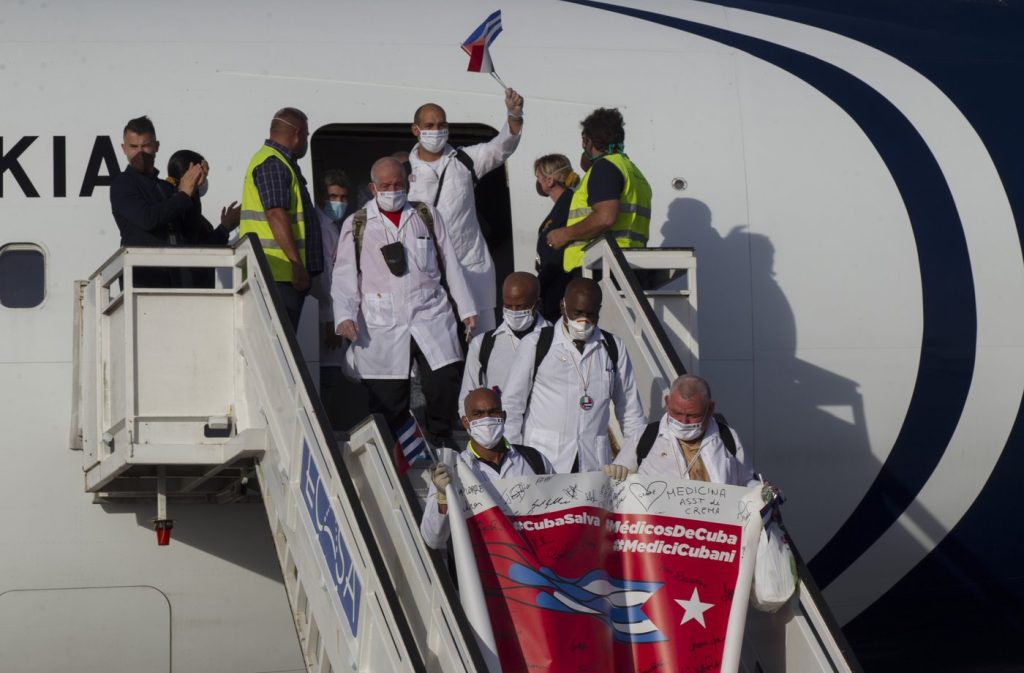SAN JUAN, Puerto Rico (AP) – A contentious request from the Inter-American Commission on Human Rights regarding Cuban medical brigades has stirred tensions among nations in the Caribbean and the Americas. The commission has reached out to members of the Organization of American States (OAS) to gather information about agreements with Cuba concerning medical missions, the labor and union rights of these workers, and any existing labor complaints. This move has been described as unprecedented and troubling by Francesca Emanuele, a senior international policy associate at the Center for Economic and Policy Research.
Cuba is known to have more than 22,000 doctors deployed across over 50 countries, with a significant presence in the Caribbean and the Americas, where many impoverished nations rely on Cuban medical professionals for vital healthcare services. The commission, which is largely supported by the U.S., intends to assess the information collected and may provide recommendations in light of ongoing allegations of rights violations related to these medical missions.
The inquiry from the commission followed a statement from U.S. Secretary of State Marco Rubio in late February, announcing visa restrictions on Cuban or foreign officials involved in Cuba's medical missions, which he categorized as "forced labor." Emanuele remarked on the suspicious timing of the commission's letter, highlighting the delicate nature of member states' sovereign decision-making in this context.
The commission issued its letter on May 24, allowing OAS member states a 30-day period to respond. So far, there has been a notable silence from these countries regarding the implications of the letter. Ralph Gonsalves, the Prime Minister of St. Vincent and the Grenadines, expressed his anticipation for a collective response during an upcoming meeting of the Organization of Eastern Caribbean States, where he serves as chairman. Gonsalves emphasized that St. Vincent adheres to various international and labor conventions and mentioned that the Cuban doctors play a crucial role in operating the nation’s only hemodialysis center, which provides care to 64 patients at an annual cost of $5 million.
Notably, Gonsalves indicated that he met with Rubio earlier in the year and conveyed detailed information about the contributions of Cuban medical professionals in St. Vincent, suggesting that he did not foresee any immediate threats of sanctions. In response to the ongoing discussion, Guyana's Foreign Minister Hugh Todd announced that the government plans to amend its payment and recruitment structures for Cuban medical professionals to ensure compliance with international labor laws. The Vice President of Guyana, Bharrat Jagdeo, echoed this sentiment, emphasizing the need to align their practices with U.S. requirements.
While some Caribbean leaders stress the importance of maintaining Cuban medical aid in the face of potential repercussions, others express a willingness to sacrifice U.S. visa access if necessary. Barbados Prime Minister Mia Mottley stated her government's readiness to confront this issue head-on, even if it results in the loss of her visa, reaffirming the essential role of Cuban professionals in providing healthcare services in the region. Trinidad and Tobago Prime Minister Keith Rowley shared a similar perspective, prioritizing national sovereignty over U.S. affiliations.
In April, Cuban President Miguel Díaz-Canel criticized what he deemed a concerted effort to undermine Cuban cooperation, framing it as part of a broader political and ideological campaign. He articulated that this strategy aims to cut off Cuba's income sources, particularly in the healthcare sector, essential to many nations in need. Rubio has defended the visa restrictions, asserting that they are necessary to promote accountability.











